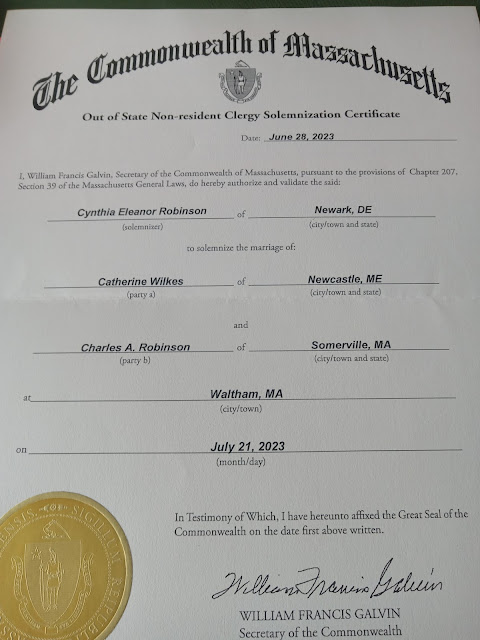Beloved
(the following is from the wedding I officiated this past Friday, for my uncle Chuck and his wife Catherine)
 |
| Photo of the certificate from the Secretary of the Commonwealth of Massachusetts that authorized me to solemnize the marriage of my uncle and his wife, now my Aunt Catherine |
One of the most amazing things about human beings is that we can create love when we need it. Sometimes that means we create and we change language because of that love. When a lawyer challenged Jesus about what it means to love one’s neighbor, Jesus expanded the idea of who is my neighbor to include anyone who shows compassion, even a perceived enemy. And then Mr. Rogers lived and taught that to whole generations of children. The apostle Paul wrote to fledgling churches populated with people who sometimes had difficulty loving each other and he addressed them using the word “brethren” to remind them that they were more than an affinity group or philosophy club. In our time we expanded that language to “brothers and sisters” recognizing that gifts for ministry and for faith expression do not solely belong to one gender. Now we understand that there are not only two genders, that gender is fluid, non-binary, transgender, intersex, and that gender expression is a social construct. So we use words like “friends and neighbors”, “kindred”, and “beloved” to signify that shared, unshakeable, unbreakable covenant called humanity.
Language in the marriage ceremony has also changed to reflect our evolving humanity. In a few moments you will hear Catherine and Charles give themselves to each other as husband and wife, rather than take one another. In every worship service there is an offering and in a wedding it is the very people who are joining their lives together, offering themselves to each other. Giving away the bride, using the word “obey”, and “if anyone knows any reason why these two should not be lawfully joined” are part of the patriarchy we are trying so hard to smash and so 19th century and so they are right out.
The traditional opening words, “Dearly beloved” have become so cliché as to be prosaic. Which is sad because wouldn’t we all like to be someone’s beloved, to be dear to someone’s heart. The word ‘beloved’ was first used in biblical language, from the Greek agapétos – divinely loved – and the Hebrew yadiyad: hand to hand, heart to heart. Now the word ‘beloved’ is coming back into church parlance as not only a way to be inclusive but expansive with language, especially for those who have been painfully excluded from community because of who they are. Sometimes it is not enough to say “friends and neighbors” or even “kindred” or “siblings” when the relationship we could have with the divine and with each other is one of belovedness, in which we reside in the heart of the divine, in the heart of those who love us. And those whom we love reside in our hearts.
And so to call one another “beloved” speaks to a covenant that goes deeper than any difference between us but to our shared humanity. Our belovedness helps to heal our relationships when we allow ourselves to become angry or pompous or rude or to seek after our self-interests. Our belovedness makes room within us for love to grow. Taking a page from Mr. Rogers, I invite all of us to think of those who loved us into being, into who we are, those who are beloved to us. Let’s take just a few moments to think of them and give thanks for them.
Whomever you’ve been thinking about, those beloved to you, know that someone has thought of you in that same way, that you are beloved, and you are the difference love makes in this world. Amen.


Comments
Post a Comment